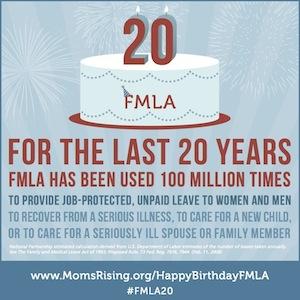
2013 is the year that the Family Medical Leave Act (FMLA) turns 20. For 20 years, the FMLA has been used to provide job-protected, unpaid leave for people across the country to recover from a serious illness, care for a new child, or care for a seriously ill spouse, parent, or child.
As we celebrate FMLA, it’s also time to talk about why our national policies need to be updated and expanded to include more Americans and why that leave needs to include wage replacement (also known as paid family leave).
Paid family leave after the birth of a child helps give kids a healthy start in life and gives families the economic security they need to stay out of poverty – and at the same time it can benefit businesses’ bottom line. This saves everyone – from parents to taxpayers to businesses – money in the long-run. In fact, studies show that paid family leave after the birth of a child combats poverty, gives children a healthy start, lowers infant mortality by more than 20%, and helps lower the wage gap between women and men. Paid leave also benefits taxpayers, because, as recent research from the Center for Women and Work at Rutgers shows, women who take paid leave are less likely to need public assistance, more likely to be working 9-12 months after a child’s birth and report increases in wages within a year of their child’s birth.



The views and opinions expressed in this post are those of the author(s) and do not necessarily reflect those of MomsRising.org.
MomsRising.org strongly encourages our readers to post comments in response to blog posts. We value diversity of opinions and perspectives. Our goals for this space are to be educational, thought-provoking, and respectful. So we actively moderate comments and we reserve the right to edit or remove comments that undermine these goals. Thanks!